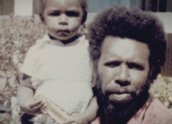


First Australians – Episode 7, We Are No Longer Shadows (2008)
Synopsis
The seventh and final episode of First Australians covers the period 1967–93, focusing on the Torres Strait Islands and Eddie ‘Koiki’ Mabo’s fight for land rights. This period was, globally, a time of increased civil rights advocacy and political activism, but also of a high level of racism and oppression of Aboriginal people, especially in Queensland.
Eddie 'Koiki’ Mabo fights for Australian law to recognise that his people own Murray Island, where they have lived for generations. In 1992, six months after his death and a decade after the statement of claim was first lodged in Queensland, the highest court in the land decides in Mabo’s favour. The outcome overturns the notion of terra nullius, that is, the notion that the land belonged to no-one at the time of white settlement.
Curator’s notes
Because this episode covers the modern era, there is a lot more film footage than in the rest of the series. It is fitting that it has the highest moving image content as Murray Island in the Torres Strait is the location of the first moving image recorded in Australia and the first ethnographic film in the world. Shot by Alfred Cort Haddon on an expedition from Cambridge University in 1898, this film is held in the collection of the National Film and Sound Archive and contains a Torres Strait Islander dance that depicts the god Malo, whose laws became the basis of the Mabo native title claim (see Torres Strait Islanders, 1898).
The availability of new film technology in the 1970s and ’80s also meant that there was a greater prevalence of home movies being made by ordinary Australians. The home movies and personal photographs of the Mabo family are scattered throughout this episode and promote audience identification with Eddie and his cause. Other significant footage featured includes Ningla A-Na (1972), which portrays the political protest for rights and sovereignty made by the Tent Embassy in Canberra and the police violence which accompanied its closure in 1972.
The fight for land rights in the Torres Strait Islands had a precedent in the Yolngu opposition to mining in Arnhem Land, and the eventual land claim. The Yolngu in Yirrkala produced a ‘bark petition’ in 1963 against the proposed mine in the area of the Gove Peninsula. The petition, which remains on display in Parliament House in Canberra, was a significant step by the Yirrkala groups in their claim for land rights.
Preparing it helped them gain the confidence to mount their historic 1970 action before the Northern Territory Supreme Court against the Nabalco mining company and the Commonwealth. The petition ultimately failed to stop the mining in the Yirrkala region, the court accepting terra nullius as a defence, which is the notion that the land belonged to no-one prior to the British landing. It was suggested that the Yolgnu traditional culture would be lost as a consequence. This subsequently led Film Australia to commission Ian Dunlop to film what became the Yirrkala Film Project (1970–96).
The victories of political pioneers like Eddie ‘Koiki’ Mabo are colossal, and were certainly not without strong, high-level opposition. There are numerous clips throughout the episode which highlight the backward views of the government, such as the then Queensland premier Joh Bjelke-Petersen and the Minister for Aboriginal Affairs at the time. In this episode you actually get to see the racism and intolerance documented on film, whereas other episodes in the series relied heavily on interpretation of historical documents.
Because of the element of truth that film brings, these awful scenes serve to remind us that racism, hate and fear of Indigenous people is not in some distant past, but is much more recent than it is perhaps comfortable for us to admit.
This episode was first broadcast on SBS on Sunday 2 November 2008.
- Overview
- Curator’s notes
- Video 3 clips
- Principal credits
- Find a copy
- Make a comment
- Map
- Add your review



